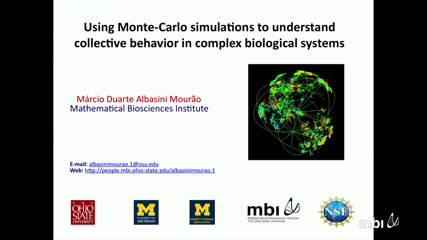MBI Videos
Using Monte-Carlo simulations to understand collective behavior in complex biological systems
-
 Marcio Duarte Albasini Mourao
Marcio Duarte Albasini MouraoComplex systems is a field of Science that seeks to understand how macroscopic behavior arises from the interaction of a large number of inter-dependent, simpler components. Here, we use Monte-Carlo simulations to understand the emergence of such behavior in two systems. In the first part of the talk, I will describe ongoing work to understand how microtubule (MT) dynamical parameters contribute to the current steady-state (SS) observations of the MT cytoskeleton in the interphase cell cycle stage of the Arabidopsis plant cellular cortex. While severing of MTs is predominantly described as just another source of MTs at SS (along with nucleation), we show that severing may play a far more critical role in the establishment of the SS behavior. In the second part of the talk, I will describe ongoing work aimed at understanding how sensory input modulates aging behavior on a population of flies. It has been shown recently that: 1) exposure to pheromones of the opposite sex increases the mortality rate of Drosophila flies and that 2) removal of exposure reverses the mortality rate of the previous flies to the mortality rate of flies never exposed to pheromones. Our model shows that heterogeneity on the population may play a significant role in enabling the reversible behavior. The two systems described here pose significant challenges in understanding how individual components contribute to experimentally observable population behavior. Our experience suggests that such challenges can only be addressed by close interactions between experimentalists and modelers.
